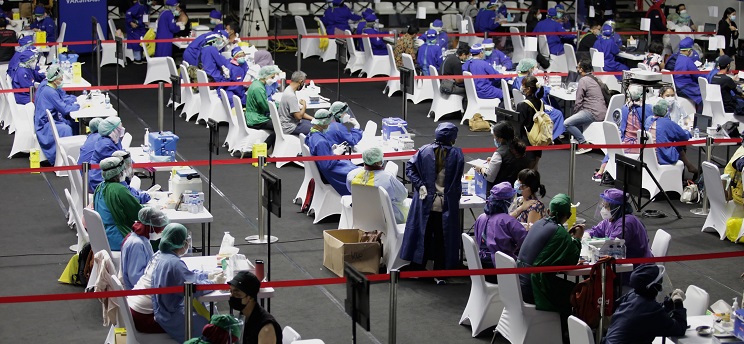The recriminations continue on our COVID vaccine rollout and the limited availability of the Pfizer vaccine, plus there are fears that new strains are much more contagious than the original virus. But in better news, the University of Queensland (UQ) reports that it has developed a needle-free vaccination that has passed pre-clinical trials.
Researchers say the COVID patch has produced excellent results in pre-clinical trials involving mouse models and developers are already lining up.
UQ’s David Muller, who has been running the trials, says the results are “amazing” and better than when the same vaccine is administered via a needle and syringe.
“The results so far have been amazing; we’ve been able to get a COVID-neutralising antibody response with a single dose in mice,” he says.
The patch delivers the vaccine via thousands of tiny ‘mini-needles’ on its surface and results in a more immediate and robust immune response compared with needles, Dr Miller says.
“Because of that targeted delivery, we’re able to generate much stronger immune responses,” he says.
Read more: Annual COVID vaccinations will be the new normal
Which is good news given authorities’ concerns about how easily the newer COVID variants are spreading.
Health authorities in locked-down Victoria say a two-hour gap between an infected person leaving a grocery store in Melbourne and another person entering was enough for the Indian variant B.1.617.1, now labelled Kappa, to spread.
Victoria’s chief health officer Brett Sutton has likened the Kappa strain to measles. He said contact tracers believe someone who visited a spice store in Epping contracted the virus two hours after a positive case had left.
“They (the positive case) were there for a substantial period of time but they had left two hours before the next exposed individual came in, who’s become a case,” he said. “That’s in the measles category of infectiousness.”
Read more: Agencies warn of vaccine black market offers
Prof. Sutton said the variant was also showing up in places where normally it would be less likely, such as well-ventilated outdoor dining settings.
But epidemiologists and health academics are split over whether the Kappa variant in Melbourne is significantly more infectious than other COVID strains.
On Wednesday, Queensland University of Technology physicist Lidia Morawska said the spread of the virus at the spice store was not necessarily due to it being more infectious.
“(The virus) can stay in the air for as long as air flow will keep them in the air – be it minutes or hours,” she said. “The transmission could have happened regardless of how infectious the strain was.”
But Raina MacIntyre, a researcher at the Kirby Institute, said the Kappa variant in Melbourne was likely to be just as infectious as its Delta counterpart in Britain, which has been assessed as being 50 per cent more infectious that earlier variants.
The World Health Organization says “it has become evident that greater public health risks are currently associated with B.1.617.2 [Delta], while lower rates of transmission of other lineages have been observed”.
Read more: Wuhan lab leak probe ramps up
Research published by the BBC says that vaccines such as the Pfizer and AstraZeneca are highly effective against the Indian variant after two doses, but that protection from one dose appears to be reduced.
It adds: “There is no evidence that any mutations of the coronavirus cause much more serious illness for the vast majority of people.
“As with the original version, the risk remains highest for people who are elderly or have significant underlying health conditions.
“But a virus being more infectious and equally dangerous will in itself lead to more deaths in an unvaccinated population.”
Have you managed to have two COVID jabs yet? Does the rollout seem flawed to you? Have your say in the comments section below.If you enjoy our content, don’t keep it to yourself. Share our free eNews with your friends and encourage them to sign up.

